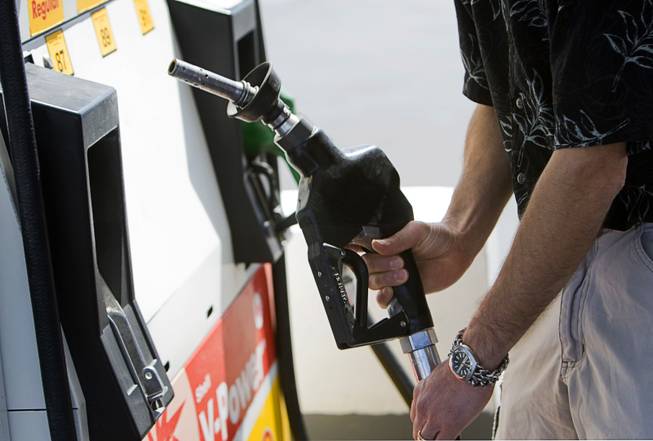
Kurtis Keeler of Jamestown, New York, replaces a pump after filling up at a gas station on Blue Diamond Road Thursday, April 14, 2011.
Friday, July 29, 2011 | 1:55 a.m.
Travel Tax
KSNV coverage of proposed alternative to gasoline tax, July 27, 2011.
Sun archives
Reader poll
Sun Coverage
The Nevada Transportation Department doesn’t want to know where you’ve been, just how many miles it took to get there.
As cars become more fuel efficient and more cars run without gas at all, states have seen a decrease in gas tax receipts.
The shortfall, expected to be about $39 million a year by 2016 in Nevada alone, has transportation departments across the country looking for alternatives.
At least 16 states and the federal government have begun studying the possibility of setting up a vehicle miles-traveled fee, a system where people would pay taxes based on how many miles they travel instead of how much gas they buy.
The idea is to set up a system where motorists in hybrids and electric cars pay their fair share for road construction and maintenance.
But the first phase of a Silver State study came to one clear conclusion: Nevadans don’t want the government knowing where they have been driving.
“The biggest thing that came up was the privacy (issue),” said Scott Rawlins, the department’s deputy director. “No one wanted a big brother or a black box in their car.”
Most of the proposed mileage fee systems are based on using GPS devices in cars to track how much — and where and when — people drive. Governments like the idea because it would allow the revenue to go different jurisdictions based on where people drive the most, plus motorists could potentially be taxed more if they drive at peak congestion times.
But the privacy concerns of such a system may prove to be insurmountable, Nevada officials learned.
When the GPS idea was presented to Nevadans last year, more than 80 percent opposed it, said Eric Herzik, a UNR political science professor who is part of the study.
“The GPS system was just a disaster,” he said. “It wasn’t just no, it was hell no.”
When Herzik told some students about the GPS units that would be installed in cars, one student said he would get a shotgun and “blow it up.”
While many states are considering or studying the concept, Nevada is one of the few states that have actively sought public feedback on the idea, Herzik said. “We came in with a first model and it got slapped. It has changed the conversation,” he said.
So for the second phase of the fee study, the Transportation Department ditched the GPS idea and is focusing on two other possible fee-collection methods.
One would require drivers to report their odometer readings to the DMV, likely annually, and then pay the tax, either annually or spread out over the year.
The other possibility is setting up a system where gas pumps would automatically record a car’s odometer reading and add the tax to the fuel price, much like the current gas tax.
While that option doesn’t solve the problem of how to tax electric vehicles, it does provide a solution that is the most simple and most familiar to most drivers, said UNLV professor Pushkin Kachroo, the director of the Transportation Research Center, which is conducting a small field test of the system.
UNLV has recruited 25 volunteer drivers to have the small transponder attached to their car and then fill up with gas at a participating station. When the motorist gets gas, the receipt shows how much they paid under the current gas tax and how much they would have paid under a mileage system.
The system is “seamless; you do exactly the same thing,” Kachroo said.
And while there will always be conspiracy theorists who say the government is tracking people, Kachroo promises the devices are not capable of doing so.
“We’ve seen the system. We designed it. We built it. We installed it,” he said. “There’s no tracking, no GPS...no privacy concerns.”
The Transportation Department hopes the small UNLV study this summer will pave the way for a larger, statewide study in the future.
“This study is going to give us a platform; here’s what works in Nevada or what doesn’t work,” Rawlins said.
Even if the study is a success, there are still a lot of legal and policy issues to be worked out, and implementation would be a decade or more away, likely coming through federal action, officials said.
But this study will give Nevada a voice in the national discussion, Rawlins said.
The department is accepting public comment on the tax idea. Comments can be sent by email to [email protected] or by regular mail to Alauddin Khan, 1263 S. Stewart Street, Carson City, NV, 89712.

Join the Discussion:
Check this out for a full explanation of our conversion to the LiveFyre commenting system and instructions on how to sign up for an account.
Full comments policy